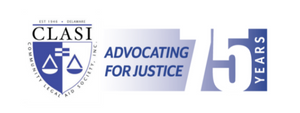The Disabilities Law Program (“DLP”) of Community Legal Aid Society, Inc. (“CLASI”) will be helping to enforce the Help America Vote Act (“HAVA”) and the Americans with Disabilities Act (“ADA”) during the General Election on November 3rd. “We want to ensure that people with disabilities have full participation in the election process, including accessing polling places and other systems so they can vote independently and privately,” said Laura J. Waterland Esq., DLP Project Director.
On Election Day, CLASI staff and volunteers from Widener Law School will be monitoring selected polling places for accessibility for people with disabilities. CLASI is also collecting direct voter feedback and is asking voters who wish to share their election day experiences to call the Disabilities Law Program at CLASI via phone 302-856-2027 or email (cgarcia@declasi.org).
Individuals with disabilities who encounter problems with access at their polling places, or with the accessibility of the absentee or mail-in-ballot process, should bring these barriers to the attention of poll workers, their county Department of Election, and the DLP (DLP can be reached at: 302-856-2027).
This year, the election looks a little different because of COVID-19. Many voters are voting by mail. The last day that the Department of Elections will send out a vote by mail ballot is 10/30. The Department of Elections will only count mail in or absentee ballots that have been received by the close of polls. Voters should make sure to fill out the ballot in blue or black ink, and to sign and date the envelope. Voters can mail their ballots back, but should consider whether the ballot will arrive in time to be counted. Voters may wish to drop their vote by mail ballots off at the voter’s County Department of Elections office instead. Voters cannot drop off their vote by mail ballots at the polling place.
For voters with disabilities or who are ill, another option is to vote by absentee ballot. If the voter has physical disabilities or is sick, they can choose to receive and submit their absentee ballot electronically by fax or email. Otherwise, the absentee ballot process is similar to the vote by mail process. Voters can obtain an absentee ballot up until noon the day before the election- November 2nd,– but bear in mind that obtaining an absentee ballot in person at one of the County Department of Elections may be only viable option this close to the election. Voters can mail the absentee ballot back, but should consider whether the ballot will arrive in time to be counted. Voters may wish to drop their absentee ballots off at the voter’s County Department of Elections.
If you decide to vote at your polling place, please know that the Department of Elections will be doing everything possible to ensure the safety for everyone there. The election officers (poll workers) will be using personal protective equipment (PPE), and will be ensuring social distancing takes place, as much as possible. The poll workers will be provided supplies to clean voting equipment and have been instructed to clean equipment after each use. Please note: masks are not required to be worn by voters but are strongly encouraged to protect poll workers and others.
Voters with disabilities going to the polling place on election day should be aware of their right to take a person of their choice into the voting booth should they require assistance in voting. They may also ask for assistance from official poll workers. People with guardians may vote under most circumstances. Voters with low vision or other impairments can utilize the Universal Voting Console, or UVC on the ExpressXL voting machines, which allows voters to listen to rather than read the ballot. Voters should not hesitate to tell poll workers that they wish to use the accessible features of the voting equipment and ask for assistance with these features if needed.
While presenting identification is preferred and will expedite the voting process, a voter without identification who is listed in the poll book may sign an affidavit affirming their identity. If you are a first-time voter who registered by mail, you may be required to show identification. Whether voters bring identification or not, it may be helpful to bring mail, such as utility, tax, rent or mortgage statements showing their address.
If a person feels intimidated or interfered with in their ability to vote, they should immediately reach out to the polling site supervisor for assistance. It is illegal under Delaware law for a person to “by force, threat, menace or intimidation, prevent or hinder, any person….qualified to vote from voting according to said person’s choice at any such general, special or municipal election.”
The only individuals allowed to challenge a person’s eligibility to vote are the two official party challengers located inside each polling location. It is worth noting that these challengers do not decide whether a person is eligible to vote; rather, a vote is taken of the two judges and the inspector. Individual voters who are found not be eligible after a challenge are to be offered a provisional ballot. A person’s disability is not a lawful basis for a challenge.
The Office of the Delaware Election Commissioner has a voter portal, https://ivote.de.gov/. At this site, voter can check the status of their registration and confirm assigned polling place locations. On Election Day, poll workers will make every effort to identify the correct polling place for voters who may have gone to the wrong polling place. However, voters should also be aware of their right to cast a provisional ballot in federal elections, should the polling place refuse to allow them to vote. Identification is required for provisional voting. Voters may also file complaints with the Delaware Election Commissioner.
